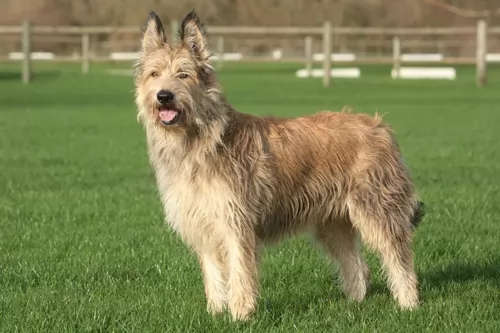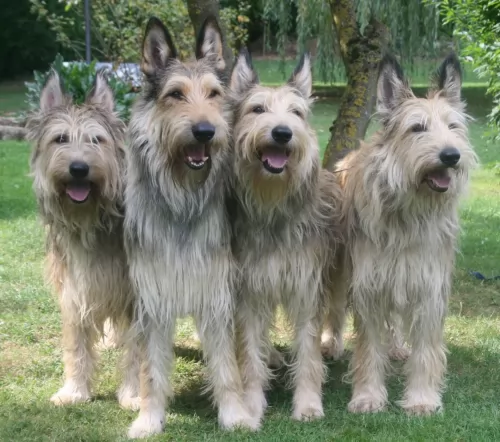 Petzlover
Petzlover Berger Picard is originated from France but Shepard Labrador is originated from United States. Both Berger Picard and Shepard Labrador are having almost same height. Both Berger Picard and Shepard Labrador are having almost same weight. Both Berger Picard and Shepard Labrador has same life span. Both Berger Picard and Shepard Labrador has same litter size. Both Berger Picard and Shepard Labrador requires Low Maintenance.
Berger Picard is originated from France but Shepard Labrador is originated from United States. Both Berger Picard and Shepard Labrador are having almost same height. Both Berger Picard and Shepard Labrador are having almost same weight. Both Berger Picard and Shepard Labrador has same life span. Both Berger Picard and Shepard Labrador has same litter size. Both Berger Picard and Shepard Labrador requires Low Maintenance.
 In the Picardie region of northeastern France saw visiting Celts/Franks enter the region along with a shepherd dog. They arrived in the Pas de Calais in 800 AD and might be the oldest shepherd dog of France. Named for Pacardy, the Berger Picard is certainly one of the most ancient of today’s French breeds. Some believe this shepherd comes from the lines of Dutch and Belgian Shepherds, while other insist he is related to the Beauceron and Briard.
In the Picardie region of northeastern France saw visiting Celts/Franks enter the region along with a shepherd dog. They arrived in the Pas de Calais in 800 AD and might be the oldest shepherd dog of France. Named for Pacardy, the Berger Picard is certainly one of the most ancient of today’s French breeds. Some believe this shepherd comes from the lines of Dutch and Belgian Shepherds, while other insist he is related to the Beauceron and Briard.
Never popular as a show dog due to its shaggy appearance, even though it was entered in Frances first dog show in 1863, the breed was almost extinct following the second World War. Currently there are a little under 5000 left in the world with most of them, 3000, in France. The Picard is a good herding dog and loved by the shepherds of the Picardy region. The United Kennel Club recognized the rare breed in 1994, but the AKC did not recognize it until 2016.
The Berger Picard is a loyal, people-oriented dog, good with children and families if socialized as a puppy. In 2006 the Berger Picard Club of America was formed as more and more dogs are being imported from France. There was a genetic study done this year that proposes that 7 breeds of shepherd all descended from a European herding dog that was all over Europe before 1859. This dog was the father of the Berger Picard, the German Shepherd, The Bergamaso Shepherd, the Lupino de Gigante, the Cane Paratore, the Cane da pasore della Lessinia e del Lagorai , and the Pastore d”oropa. After recognition, the Picard was shown for the first time at Krufts in March 2016. They followed that with a best of breed win by Gabby, Guess V.D. Benedicks
 The Labrador/German Shepherd mix, known as the Shepard Labrador was no doubt first bred in the United States from two very popular dog breeds - the Labrador and the German Shepherd.
The Labrador/German Shepherd mix, known as the Shepard Labrador was no doubt first bred in the United States from two very popular dog breeds - the Labrador and the German Shepherd.
Breeders of this dog were looking to bring about a dog that could be an exceptional companion with characteristics from both breeds.
Also referred to as the Sheprador, the dog will surely have an amazing temperament.
 The Berger Picard is a muscular, medium sized, faithful companion. He is especially great with an owner who is athletic and energetic. They have a rugged constitution, slightly longer back, and full tail. The coat is thick, strong and harsh. They are never overweight or bulky. This gives the Berger Picard the look of a mixed breed dog. They have erect ears and thick eyebrows. This lanky looking dog is alert and lively. Movement is efficient, free and tireless. They have strong bones with a sturdy build and a take charge personality.
The Berger Picard is a muscular, medium sized, faithful companion. He is especially great with an owner who is athletic and energetic. They have a rugged constitution, slightly longer back, and full tail. The coat is thick, strong and harsh. They are never overweight or bulky. This gives the Berger Picard the look of a mixed breed dog. They have erect ears and thick eyebrows. This lanky looking dog is alert and lively. Movement is efficient, free and tireless. They have strong bones with a sturdy build and a take charge personality.
They have a strong rectangular head that is not massive. His eyes are oval and medium sized, never round or protruding. Eye color should be dark and never yellow. Cheek muscles are strong, and muzzle is smooth, ending abruptly at the nose. Scissors bite, deep chest and round feet. There should not be any dewclaws on the back legs.
 With the Shepard Labrador, because the puppies come from two pure breeds – the Labrador and the German Shepherd, there is no really knowing how your pet will turn out. There is therefore no standard appearance.
With the Shepard Labrador, because the puppies come from two pure breeds – the Labrador and the German Shepherd, there is no really knowing how your pet will turn out. There is therefore no standard appearance.
Some will have floppy ears like the Labrador, some erect ears like the German Shepherd. The tail will always be long. The coat will always be thick and be short to medium in length. Some puppies will be born with a fawn shade and others will have the dark colors of the German Shepherd. Some will have a mix of colors.
They will be fairly large dogs standing at between 53 and 62m in height and weighing between 23 and 36kg.
Between two such splendid dog breeds, you’re guaranteed to get a wonderful temperament – after all, that's why the two breeds were brought together. Your Shepard Labrador will be friendly, playful, social,smart, courageous, loving, loyal and energetic, just loving to be around his human family.
These dogs get on well with children, and with training and socialization will get on well with other pets in the home. This dog really makes a splendid family pet.
 The Berger Picard needs to be a part of a pack with an owner who is clearly the pack leader. This is an intelligent, friendly, and sensitive to harsh voice scolding. They are not easy to train, and you need to be calm and patient when working with him. The Picard has a tendency to be stubborn with an owner who appears to be weak. If raised with or socialized to children and other animals, they will live fine with them. They are best in a rural environment rather than a close neighborhood. They are very quiet dogs, but they need a job and they excel at work.
The Berger Picard needs to be a part of a pack with an owner who is clearly the pack leader. This is an intelligent, friendly, and sensitive to harsh voice scolding. They are not easy to train, and you need to be calm and patient when working with him. The Picard has a tendency to be stubborn with an owner who appears to be weak. If raised with or socialized to children and other animals, they will live fine with them. They are best in a rural environment rather than a close neighborhood. They are very quiet dogs, but they need a job and they excel at work.
 There are studies that show that dogs provide us with so many good things – companionship, comfort and relaxation.They provide us with entertainment too because some of them are so amusing with their antics.
There are studies that show that dogs provide us with so many good things – companionship, comfort and relaxation.They provide us with entertainment too because some of them are so amusing with their antics.
The Shepard Labrador is like that – he is social, friendly, loving and devoted and by bringing him into your home, you’re signing up for 10 – 14 years of sheer pleasure, less stress and superb companionship.
 The Berger Picard is not a heavy or extra-large dog, but they still can have hip dysplasia, though it is not nearly as prevalent as it is in larger breeds. Eye infections can present in puppies more than adults and hereditary eye issues such as PRA and RD are all too common. (Progressive Retina Atrophy and Retinal Dysplasia)
The Berger Picard is not a heavy or extra-large dog, but they still can have hip dysplasia, though it is not nearly as prevalent as it is in larger breeds. Eye infections can present in puppies more than adults and hereditary eye issues such as PRA and RD are all too common. (Progressive Retina Atrophy and Retinal Dysplasia)
 The Shepard Labrador is a healthy dog breed, and with the right nutrition and exercise can reach 10 to 14 years of age. There are always going to be those common dog illnesses that many dogs succumb to. Some of them are hip dysplasia, cancer, skin problems and parasites.
The Shepard Labrador is a healthy dog breed, and with the right nutrition and exercise can reach 10 to 14 years of age. There are always going to be those common dog illnesses that many dogs succumb to. Some of them are hip dysplasia, cancer, skin problems and parasites.
Hip dysplasia is a condition where parts of the hip joints don’t fit properly together. This creates a situation where there is abnormal wear and tear on the joints. It can lead to arthritis even and pain for your dog.
The tapeworm is a parasite spread to dogs but also to people, and it is through the ingestion of infected fleas. You can often detect this when you discover parts of the worm crawling in your dog’s bowel movements or they can be around the anus. You can suspect this when you see your pet losing weight and having diarrhea. Speak to your vet about how to control fleas with your dog.
This is a fatal disease where dogs are infected through bites from rabid animals. You’ll notice horrible behavioral changes in your dog. Unfortunately with this terrible disease, once symptoms appear, it is virtually too late for treatment.
 This is an athletic and active breed with a lot of energy. They need a high-quality food that is full of nutrients and not empty calories. Don’t overfeed him as some will have a tendency to become obese. They should be fed twice a day in equal proportions. Treats are good when training but don’t overdo it.
This is an athletic and active breed with a lot of energy. They need a high-quality food that is full of nutrients and not empty calories. Don’t overfeed him as some will have a tendency to become obese. They should be fed twice a day in equal proportions. Treats are good when training but don’t overdo it.
Since the Berger Picard has not been overbred, there are not a lot of genetic disorders in the breed. They do have some
You should have your puppy certified by the Orthopedic Foundation for Animals (OFA) and then the Canine Eye Research Foundation that they do not have these issues and if they do, resolve them. The results of these tests should be published in the OFA registry. This breed is also a participant in the Canine Health Information Center. This means their eyes and hips have been checked and the results published. Their blood is being stored for DNA purposes and one of the following have been evaluated: heart, elbows or thyroid. There is an OFA Berger Picard health survey whose results are available to anyone who asks. This does not track individual dogs but the breed as a whole.
This is a breed that needs a lot of exercise. She likes to swim, take long walks, take runs with you on your bike. They love to jog with you as well. Agility, obedience and any other type of competition will appeal to your Picard. However, don’t expect them to excel at competition because they are not consistent performers. But if they don’t get enough exercise and fun they will become very destructive. Barn hunt and non-competitive herding activities are perfect for the Picard.
 ◆Brush the coat of your Shepard Labrador twice a week to rid the coat of loose hairs and to keep the coat shiny ad healthy. Many people add in the Omega 3/6 oils to the dog’s food to ensure a healthy skin and coat.
◆Brush the coat of your Shepard Labrador twice a week to rid the coat of loose hairs and to keep the coat shiny ad healthy. Many people add in the Omega 3/6 oils to the dog’s food to ensure a healthy skin and coat.
◆Check the ears and eyes for infection. Make sure there are no signs of redness and discharge.
◆Check the inside of your pet’s mouth He has no way of telling you that a rotten tooth in the mouth is causing hi tremendous pain and affecting the his health.
◆Provide your pet with a warm, dry place to sleep. Make sure if he is outdoors that he has both sun and shade.
◆Feed your pet the best food there is. Your Shepard Labrador will no doubt be served commercially manufactured food. There are good and bad varieties. Make sure it is one of the better brands to ensure you don’t end up feeding your pet foods packed full of unhealthy ingredients such as colorants, preservative and fillers.
Try and include some home-made food to the diet. Boiled chicken, brown rice or pasta and spinach, sweet potatoes and carrots are a healthy choice for your pet as it won’t upset your dog’s digestive system.
Also try and include some raw meat into the diet as this can help in fighting off skin problems. Ensure your Shepard Labrador always has access to a bowl of fresh, cool water.